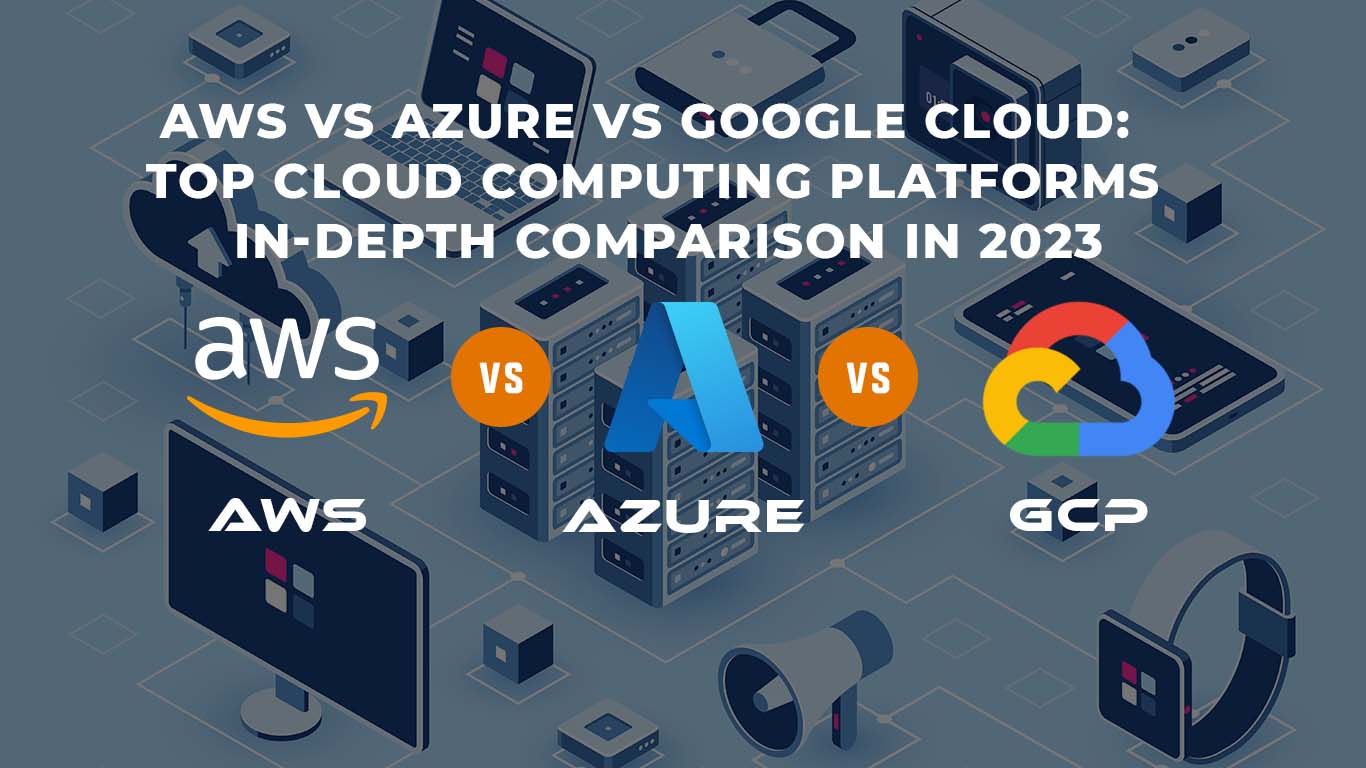AWS vs Azure vs Google Cloud: Top Cloud Computing Platforms in-depth Comparison in 2023
In recent years, cloud computing has revolutionized the way businesses operate. Gone are the days when companies had to rely on expensive on-premises infrastructure to host their applications and data. Instead, they can now take advantage of cloud services provided by major players like Amazon Web Services (AWS), Microsoft Azure, and Google Cloud Platform (GCP).
These three cloud providers are the most popular choices for businesses looking to move their operations to the cloud. Each of them offers a range of services and features that cater to different business needs, and they all have their unique strengths and weaknesses. In this article, we’ll take an in-depth look at AWS, Azure, and GCP and compare their features, pricing, and performance.
Amazon Web Services (AWS)
AWS is a cloud computing platform that offers a range of services, including computing, storage, and database. It was launched in 2006 by Amazon, and it quickly became the market leader in cloud computing. Today, AWS has a market share of around 32%, making it the most popular cloud provider in the world.
AWS offers a range of services that cater to different business needs. Here are some of the most popular services:
- EC2 (Elastic Compute Cloud): This service provides scalable computing capacity in the cloud. It allows users to launch virtual machines (VMs) on-demand, and pay only for the hours they use. EC2 is ideal for businesses that need to run applications that require a lot of computing power.
- S3 (Simple Storage Service): This is a scalable object storage service that allows users to store and retrieve data from anywhere on the web. It is ideal for storing large amounts of unstructured data such as images, videos, and backups.
- RDS (Relational Database Service): This service provides managed database instances for popular databases such as MySQL, PostgreSQL, Oracle, and Microsoft SQL Server. It is ideal for businesses that need to run database-driven applications.
- Lambda: This service allows users to run code in response to events such as changes in data or the arrival of new data. It is ideal for businesses that need to run code in a serverless environment.
AWS has a pricing model that is based on usage. Users pay only for their services, and there are no upfront costs. AWS also offers a free tier that provides access to many of its services at no cost for 12 months.
One of the main advantages of AWS is its global infrastructure. AWS has data centers in over 190 countries, which means that businesses can choose to host their applications and data in the region that is closest to their users. This can help to reduce latency and improve performance.
Another advantage of AWS is its ecosystem of third-party services. AWS has a vast marketplace of third-party services and applications that users can choose from. This means that businesses can easily integrate with other services and tools that they are already using.
Microsoft Azure
Microsoft Azure is a cloud computing platform that was launched in 2010. It is the second-largest cloud provider in the world, with a market share of around 20%. Azure offers a range of services that cater to different business needs. Here are some of the most popular services:
- Virtual Machines: This service provides scalable computing capacity in the cloud. It allows users to launch virtual machines (VMs) on-demand, and pay only for the hours they use. Azure VMs support both Windows and Linux operating systems.
- Blob Storage: This is a scalable object storage service that allows users to store and retrieve data from anywhere on the web. It is ideal for storing large amounts of unstructured data such as images, videos, and backups.
- SQL Database: This service provides managed database instances for Microsoft SQL Server. It is ideal for businesses that need to
- Azure Functions: This service allows users to run code in response to events such as changes in data or the arrival of new data. It is similar to AWS Lambda and is ideal for businesses that need to run code in a serverless environment.
- Azure App Service: This service allows users to deploy web and mobile applications in the cloud. It supports a range of programming languages and frameworks, making it easy to deploy existing applications to Azure.
Like AWS, Azure has a pricing model that is based on usage. Users pay only for their services, and there are no upfront costs. Azure also offers a free tier that provides access to many of its services at no cost for 12 months.
One of the main advantages of Azure is its integration with Microsoft’s existing products and services. This makes it easy for businesses that are already using Microsoft products, such as Office 365 and Dynamics 365, to integrate with Azure.
Azure also has a strong focus on hybrid cloud deployments. This means that businesses can easily integrate their existing on-premises infrastructure with Azure, allowing them to move their operations to the cloud at their own pace.
Google Cloud Platform (GCP)
GCP is a cloud computing platform that was launched in 2011 by Google. It is the third-largest cloud provider in the world, with a market share of around 9%. GCP offers a range of services that cater to different business needs. Here are some of the most popular services:
-
Compute Engine: This service provides scalable computing capacity in the cloud. It allows users to launch virtual machines (VMs) on-demand, and pay only for the hours they use. Compute Engine supports both Windows and Linux operating systems.
-
Cloud Storage: This is a scalable object storage service that allows users to store and retrieve data from anywhere on the web. It is ideal for storing large amounts of unstructured data such as images, videos, and backups.
-
Cloud SQL: This service provides managed database instances for MySQL, PostgreSQL, and SQL Server. It is ideal for businesses that need to run database-driven applications.
-
Cloud Functions: This service allows users to run code in response to events such as changes in data or the arrival of new data. It is similar to AWS Lambda and Azure Functions and is ideal for businesses that need to run code in a serverless environment.
-
Azure App Service: This service allows users to deploy web and mobile applications in the cloud. It supports a range of programming languages and frameworks, making it easy to deploy existing applications to Azure.
Like AWS and Azure, GCP has a pricing model that is based on usage. Users pay only for their services, and there are no upfront costs. GCP also offers a free tier that provides access to many of its services at no cost for 12 months.
One of the main advantages of GCP is its integration with Google’s existing products and services. This makes it easy for businesses that are already using Google products, such as G Suite and Google Analytics, to integrate with GCP.
GCP also has a strong focus on machine learning and artificial intelligence. It offers a range of services that allow businesses to build and deploy machine learning models in the cloud, making it an attractive option for businesses that want to take advantage of AI technologies.
The main difference between AWS vs Azure vs Google Cloud:
Machine Learning and AI: AWS, Azure, and GCP all offer machine learning and artificial intelligence (AI) services, but they differ in terms of their level of sophistication and ease of use. AWS has the most mature and advanced set of machine learning and AI services, including Amazon SageMaker, Amazon Rekognition, and Amazon Comprehend. Azure also has a strong set of machine learning and AI services, including Azure Machine Learning and Cognitive Services. GCP has made significant investments in machine learning and AI in recent years and offers a range of services including Google Cloud AutoML and Google Cloud AI Platform.
Security: AWS, Azure, and GCP all prioritize security and offer a range of security features, including network security, data encryption, and identity and access management. AWS and Azure are generally considered to have the most advanced security features, but GCP has made significant investments in improving its security features in recent years and is catching up quickly.
Support: AWS, Azure, and GCP all offer different levels of support, ranging from basic documentation to 24/7 customer support. AWS and Azure have more mature support offerings than GCP, but GCP is working to expand its support offerings.
In summary, the main differences between AWS, Azure, and GCP lie in their market share, service offerings, pricing, performance, integration, machine learning, AI, security, and support. Businesses should evaluate each provider based on their specific needs and requirements in order to determine which cloud provider is the best fit for them.
Comparison in AWS vs Azure vs Google Cloud
Now that we’ve looked at the features of AWS, Azure, and GCP, let’s compare them in terms of their pricing, performance, and other factors.
Pricing: All three cloud providers offer a pricing model that is based on usage, with no upfront costs. However, the pricing of each service can vary depending on the cloud provider. AWS is generally considered to be the most expensive of the three, while GCP is deemed to be the cheapest.
Performance: The performance of each cloud provider can vary depending on the specific service and the location of the user. AWS has a global infrastructure with multiple availability zones, making it a popular choice for businesses that require high availability and low latency. Azure also has a global infrastructure with multiple data centers, while GCP has fewer data centers than AWS and Azure.
Ease of use: All three cloud providers offer user-friendly interfaces and APIs that make it easy for businesses to deploy and manage their applications in the cloud. However, each cloud provider has its own unique features and services, so businesses may find one provider more user-friendly than the others depending on their specific needs.
Integration: AWS, Azure, and GCP all offer integration with a wide range of third-party services, as well as with their own products and services. AWS has the largest ecosystem of third-party services, while Azure has strong integration with Microsoft’s existing products and services, and GCP has strong integration with Google’s existing products and services.
Security: All three cloud providers offer a range of security features, including network security, data encryption, and identity and access management. AWS and Azure are generally considered to have the most advanced security features, while GCP has made significant investments in improving its security features in recent years.
Machine learning and AI: AWS, Azure, and GCP all offer a range of machine learning and AI services, including natural language processing, image recognition, and predictive analytics. AWS is generally considered to have the most advanced machine learning and AI services, while Azure and GCP have also made significant investments in this area.
Support: AWS, Azure, and GCP all offer different levels of support, ranging from basic documentation to 24/7 customer support. AWS and Azure have been in the market for longer and therefore have more mature support offerings, while GCP is working to expand its support offerings.
Conclusion of AWS vs Azure vs Google Cloud
AWS, Azure, and GCP all offer a range of services and features that can meet the needs of different businesses. When choosing a cloud provider, businesses should consider their specific requirements, such as pricing, performance, ease of use, integration, security, and machine learning and AI capabilities. It is also important to consider the level of support that each cloud provider offers, as this can be crucial for businesses that rely on the cloud for mission-critical applications.


